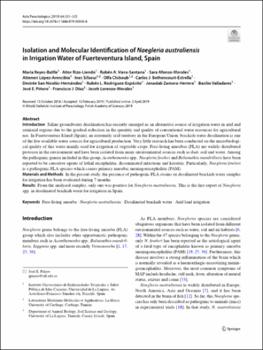Isolation and molecular identification of Naegleria australiensis in irrigation water of Fuerteventura Island, Spain.
Autor
Díaz Peña, Francisco Javier ; Reyes Batlle, María; Rizo Liendo, Aitor; Viera Santana Rubén A.; Afonso Morales, Sara; López Arencibia, Atteneri; Sifaoui, Inés
; Reyes Batlle, María; Rizo Liendo, Aitor; Viera Santana Rubén A.; Afonso Morales, Sara; López Arencibia, Atteneri; Sifaoui, Inés ; Chiboub, Olfa; Bethencourt Estrella, Carlos J.; San Nicolás Hernández, Desirée; Rodríguez Expósito, Rubén L.; Zamora Herrera, Jornadab; Piñero, José E.; Lorenzo Morales, Jacob
; Chiboub, Olfa; Bethencourt Estrella, Carlos J.; San Nicolás Hernández, Desirée; Rodríguez Expósito, Rubén L.; Zamora Herrera, Jornadab; Piñero, José E.; Lorenzo Morales, Jacob ; Valladares Hernández, Basilio
; Valladares Hernández, Basilio
Fecha
2019Resumen
Saline groundwater desalination has recently emerged as an alternative source of irrigation water in arid and semiarid regions due to the gradual reduction in the quantity and quality of conventional water resources for agricultural
use. In Fuerteventura Island (Spain), an extremely arid territory in the European Union, brackish water desalination is one of the few available water sources for agricultural production. Very little research has been conducted on the microbiological quality of this water mainly used for irrigation of vegetable crops. Free-living amoebae (FLA) are widely distributed protozoa in the environment and have been isolated from many environmental sources such as dust, soil and water. Among the pathogenic genera included in this group, Acanthamoeba spp., Naegleria fowleri and Balamuthia mandrillaris have been reported to be causative agents of lethal encephalitis, disseminated infections and keratitis. Particularly, Naegleria fowleri
is a pathogenic FLA species which causes primary amoebic meningoencephalitis (PAM).





